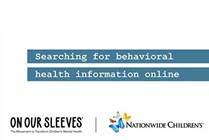Search Results
Viewing: 521-530 of 950 | All
Article
Circumcision: Newborn with a Plastibell
How to prepare for your newborn son's Circumcision with a plastibell.

Condition
Pyloric Stenosis
Pyloric stenosis is a problem that affects babies between birth and 6 months of age. In pyloric stenosis, the muscles in the lower part of the stomach enlarge, narrowing the opening of the pylorus and eventually preventing food from moving from the stomach to the intestine.

Condition
Congenital Heart Defects
Congenital heart defects are problems with the heart that are present at birth. Some are simple and don’t need treatment, while others require surgery.

Condition
Total Anomalous Pulmonary Venous Return (TAPVR)
Total anomalous pulmonary venous return (TAPVR) is a condition where the blood vessels in the lungs, called the pulmonary veins, are not attached to the heart in the right place. Because of this, the body can’t get enough oxygen.
News
Nationwide Childrens Hospital Reminds Parents to Stay Alert during the Holidays
The holidays are an exciting and busy time of year as parents race to finish their shopping, decorating and baking. As the number of days left in the calendar year winds down, be sure to allow plenty of time in that hectic schedule for sharing holiday traditions as a family.

eTeen Mental Health
In today’s world, everyone uses the Internet. It’s a good way to find quick answers to our questions. Here are some tips for finding information about your mental health online!

News
Despite Decrease in Recent Years, Rate of Sledding-Related Injuries Still Concerning
A new study conducted by researchers at the Center for Injury Research and Policy at Nationwide Children’s Hospital found that 220,488 patients were treated in U.S. emergency departments for injuries related to sledding from 2008 through 2017. Nearly 70% of these patients were children age 19 years and younger. Compared to adults, children were almost seven times as likely to be treated in an emergency department for a sledding-related injury.
Article
Monitoring Blood Glucose
Be informed about diabetes. Read this chapter to learn how to properly monitor your blood glucose.
Article
Clean Catch Urine Collection
This Helping Hand™ explains what steps to take if a clean catch urine specimen is ordered for your child.
